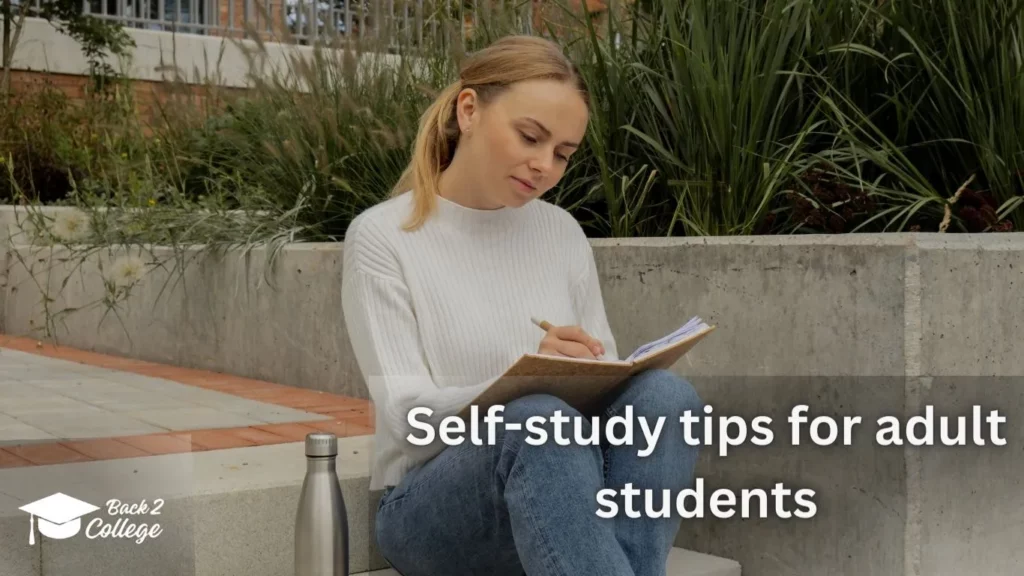Adult students have the burden of balancing family, work, and personal responsibilities, all while keeping their grades up; young students usually don’t.
Consequently, many adult students self-study to get ahead; however, not everyone succeeds. Many adult learners, including myself, have trouble teaching themselves and thrive on passive learning.
It does not mean that you cannot self-study if you’ve similar challenge. Rather, you need to adjust your studying habits to understand better what you’re learning.
To help you make your studying effective as an adult student, I’ve compiled the following list of self-study tips so you can achieve your academic goals.
Seven Self-Study Tips for Adult Students
You can easily retain a lot of information without cramming for hours if you set your goals and priorities, engage in active learning, maximize your use of available resources, and test yourself.
Here are some self-study tips for adult students to succeed:
1. Pay Attention in Class
Students, particularly adult learners, are often in a hurry to get through class so that they can cram the information on their own. Using this method will make it impossible for you to retain information..
Instead, focus on getting the most out of all your classes by being attentive and active.. Here’s how to do this—
- Take Notes
Note taking can help you deepen your understanding and improve your memory of what you’ve learned. This will help you remain attentive and focused on the topic at hand.
- Make a List of Questions
Leave some space for questions. Think deeply about what you’re learning, and highlight your struggles. Subsequently, when your teacher asks for questions, take your queries up with them.
- Observe the Topics Your Teacher Emphasizes the Most
Teachers have their preferred teaching methods. Studying the topics that your professor is most passionate about can help you learn.
Since your teacher is well-informed on the subject, paying attention to what they emphasize will help you study more efficiently..
2. Set Clear and Realistic Goals
Before you enroll in a course, set clear goals for yourself so you know what you need to learn and how much time you have to do it.
Ask yourself these questions:
- What is my purpose for studying this subject?
- What will be the benefits of learning this topic?
- How will this help me in my career or personal life?
Specifying your goals and keeping them reasonable will help you focus on your efforts and make consistent progress.
For example, instead of vaguely saying, “I want to learn Spanish,” say, “I want to pass the B2 level exam in Spanish by the end of this year.”
3. Choose the Right Resources
There are endless academic resources available on the internet—books, online classes or courses, podcasts, videos, and apps—just to mention a few.
However, you may observe that not all of them are suitable for your needs or preferences. Thus, you need to assess the resources that match your learning style, ability, and interests.
For instance, you may prefer watching videos or using flashcards if you are a visual learner. Alternatively, you may prefer listening to audiobooks or podcasts if you are an auditory learner.
These are six ways to maximize your resources—
- Make notes on the key information when you read or during your lectures.
- Discuss the material with others or teach it to a friend.
- Connect what you learn with real world examples.
- Work with study groups or connect with mentors, tutors, or coaches.
- Create your personal study guide to revise before exams.
- Utilize mnemonic devices, such as poems, acronyms, or songs, when memorizing.
Don’t be afraid to use a combination of all these resources to enhance your learning experience.
4. Make a Study Plan and Schedule
Go through your learning objectives, assess the syllabus for each of your courses, take note of important submission dates and exams. Thereafter, create a study schedule for the year or at least the semester. Time management is the key here.
From this schedule, establish your study plan. This will help you organize your time and stay on track; you can decide how much time to allocate to self-studying each day or week leading up to your exams.
Furthermore, outline the topics you need to cover for each study session and how to revise them before the exam.
For instance, use a calendar or planner (preferably Google Calendar, so you can make quick changes and have it on you at all times) to mark your study days and hours.
Write down the specific tasks or objectives you set out to achieve in each session. Set reminders or alarms for them to help you stick to your schedule.
5. Use Active Learning Strategies
Active learning occurs when you engage with what you’re studying using multiple methods as opposed to passively reading or listening to it.
It involves implementation of learning strategies such as summarizing, questioning, note-taking, creating mind maps, and applying what you’ve learned through self-evaluation or lecturing.
Other active learning strategies include:
- Class Discussions
- Group Activities and Collaborative Projects
- Think-Pair-Share
- Case Studies
- Peer Teaching
- Debates
- Problem-Based Learning (PBL)
- Simulations and Role-Playing
- Jigsaw Technique
- Interactive Quizzes and Polls
- Concept Mapping
- Peer Review
- Mnemonic Devices and Visualization
- Brainstorming
These strategies can help you deepen your understanding and better retain what you’ve learned. This will develop your study skills and memory!
For example, write down the key points and ask yourself questions about the topics after reading a chapter from a book or watching a lecture.
Making notes after studying helps you process the information in your own words, which makes it easier to understand and remember.
You can even explain the topic to someone else and have them question you.
6. Seek Feedback and Support
Self-studying does not mean locking yourself in your room alone with your textbooks.
You can benefit immensely from feedback and support from others who are learning the same topic as you or have more experience in your field of study.
This provides you with validation of your study, which improves your memory and confidence.
Join online forums, groups, or communities where you can ask questions, exchange notes, share ideas, or discuss problems with other learners. In addition, regularly communicate with your academic advisor or counsellor for guidance.
Organize group study sessions to help each other understand the material better if you have friends who study the same topic. Get your study materials organized before your group study session to make the best out of it.
Moreover, any topic can be analyzed from different perspectives and if you’re lucky enough, you may find the easiest way to understand it through socialization.
Alternatively, you can reach out to a mentor, tutor, or coach who will guide you, clear your doubts, and give you insights and constructive feedback.
Remember to assess your own strengths and weaknesses and identify what you can do better. Let your family members and friends fuel your learning fire. Stay on top of things with a plan so smart, you’ll conquer goals with a smile!
7. Reward Yourself and Celebrate Achievements
Learning is challenging; self-studying is even more so. However, you can make this less of a chore and more fun and rewarding. Recognize your efforts and keep track of your achievements so that you can celebrate accordingly.
You can reward yourself with something that makes you happy or motivates you to keep studying, such as buying a new book, eating a treat, or simply taking a break.
Rewards trigger a positive feedback response in our brains, which helps us to associate tasking activities, such as studying, with good emotions. Consequently, this reduces your stress levels and fosters a positive attitude towards studying.
Study Habits to Avoid as an Adult Learner
Primarily, your inability to effectively learn after adopting these aforementioned study tips likely stems from your failure to break bad study habits.Many learners have counterproductive study habits without realizing it.
However, you can easily identify and prevent them from taking over your study sessions. The following are study habits to avoid as an adult learner:
Cramming
Many students cram numerous topics together into one session. While you may feel confident in your ability to cram chunks of information in a few hours, it’s only going to lower your grades and affect your health—It isn’t practical.
When you cram, the information overload causes you to forget a lot of what you’ve studied. Conversely, studying in short breaks can help you remember and understand what you’re learning.
Multitasking
Many people think that being able to do many things at once is a sign of intelligence; however, it’s not good for you while learning.
Multitasking during study sessions significantly reduces your productivity and focus.
It makes it harder for you to concentrate on one task at a time and splits your focus into different things. Additionally, you’re more likely to give up studying altogether for distractions such as TV, social media, or phone calls.
Listening to Music
There is an ongoing debate on whether music is good for focus or not.
Music, whether instrumental or lyrical, divides your attention while studying. Your “inner voice” becomes muted due to the music, which makes it harder for your mind to process and store information. Thus, music is a detrimental factor to effective studying.
Ensure to cut out all forms of distractions while studying, and focus solely on what you’re learning.
Even though it takes time to master this, it’s one of the best solutions for people with attention deficit hyperactivity disorder.
Skipping Classes
Your lectures may seem like a chore; however, they’re your ultimate learning resource.
Classes give you the opportunity to have your material explained to you thoroughly by an expert on the subject and clarify your queries.
Moreover, you might miss out on vital information shared by your teacher regarding tests and exams if you skip classes.
Not Making an Outline
Most students follow the syllabus handed to them or make a rough to-do list; however, this is not practical and students often deviate from it.
Instead, make a clear outline of what you need to study, important deadlines and test dates, as well as revision days. An effective study plan will help you stick to your studies and keep track of your progress.
Not having an outline to refer back to is also the reason why most students procrastinate, forget important submission dates, and cram for exams.
Procrastinating
The worst habit a learner can have is constant procrastination. This occurs when you delay your work until the deadline, which often comes with long days of guilt and regret.
Procrastinating is highly counterproductive, as it lowers the quality of your work and stresses your mind. This can put you at risk of failing a course.
While you may feel confident that you can put off studying, the effort it took for you to avoid the work is much greater than the work itself.
Pulling an All Nighter
Besides cramming and procrastination, many students also tend to pull all-nighters for exams, assignments, and presentations.
Whether you’ve been procrastinating or are simply on a motivation kick, it is advisable you don’t pull all-nighters.
Working continuously for long hours uninterruptedly puts your mind under immense pressure, which drastically decreases the quality of your work. In addition, it disrupts your sleep cycle, which puts your body at risk of many illnesses.
Eating Unhealthy Food
Avoid unhealthy eating habits. Many students overlook this and continuously fill themselves with junk food and caffeine. Consequently, it causes body weakness, fatigue, and puts them at risk of debilitating diseases.
Eat well-balanced meals, including vegetables, fruits, grains, and protein, to upkeep your energy levels and protect your body’s natural immunity. Furthermore, ensure that you eat on time and avoid skipping meals.
Final Thoughts: Self Study Tips for Adult Learners Headed Back to College
Self-studying is a powerful tool adult students can adopt to learn and apply any type of information. To do this effectively, you only need to study smart maintaining a full time job.
I hope my self-study tips for adult learners have helped you find your own path to improvement. This tips worked for me when I obtained my college degree, and I believe they will work for you as well.
Remember, self-studying requires dedication and discipline, as well as motivation and courage. Happy learning!






